Podcast: Play in new window
BOB HIRSHON (host):
Tasmanian devils’ deadly bites. I’m Bob Hirshon and this is Science Update.
From rabid dogs to malarial mosquitoes, many biting animals spread disease. But in the case of Tasmanian Devils, it’s the biters who usually get infected. According to University of Tasmania zoologist Rodrigo Hemede, these small, aggressive marsupials are endangered by a rare kind of infectious cancer, which is transmitted by biting. When Hemede’s team examined wild devils, they expected to find tumors mostly on external bite wounds.
RODRIGO HEMEDE (University of Tasmania, Australia):
But most of the tumors occurred inside the devil’s mouth, which actually suggests the biter was the one being infected.
HIRSHON:
In fact, the fewer bite wounds a devil had, the more likely it was to be infected – suggesting that the most aggressive, dominant animals are the most susceptible. Hemede says this insight may help conservationists save the species from this lethal disease. I’m Bob Hirshon for AAAS, the Science Society.

